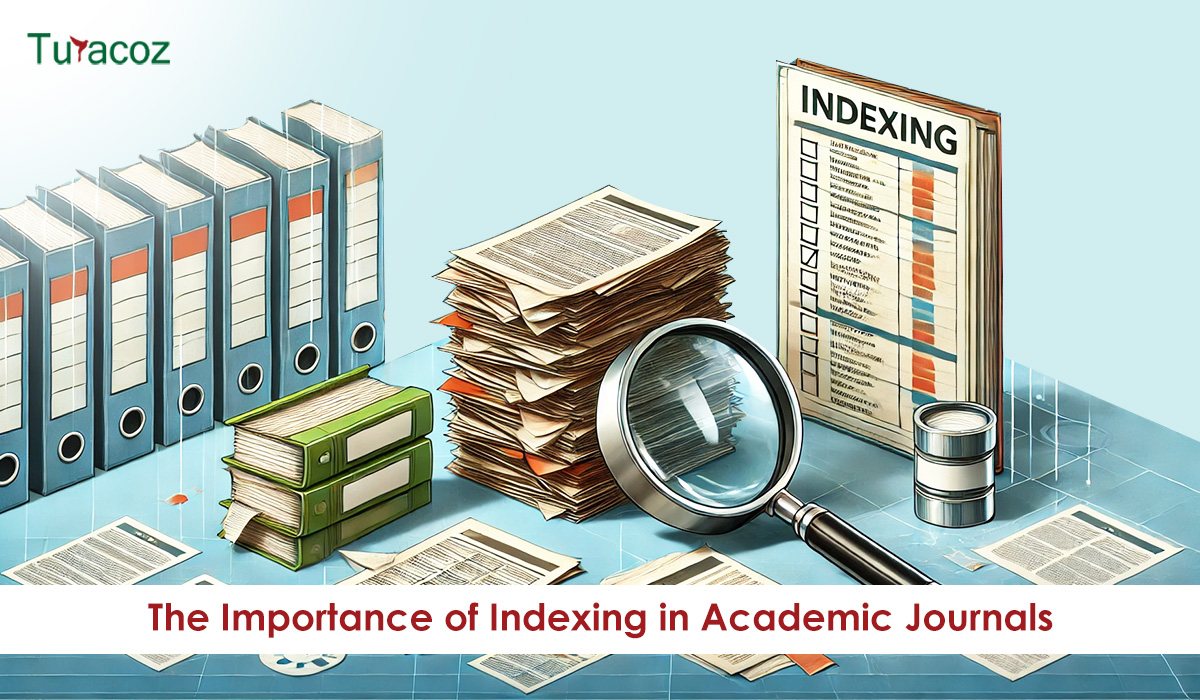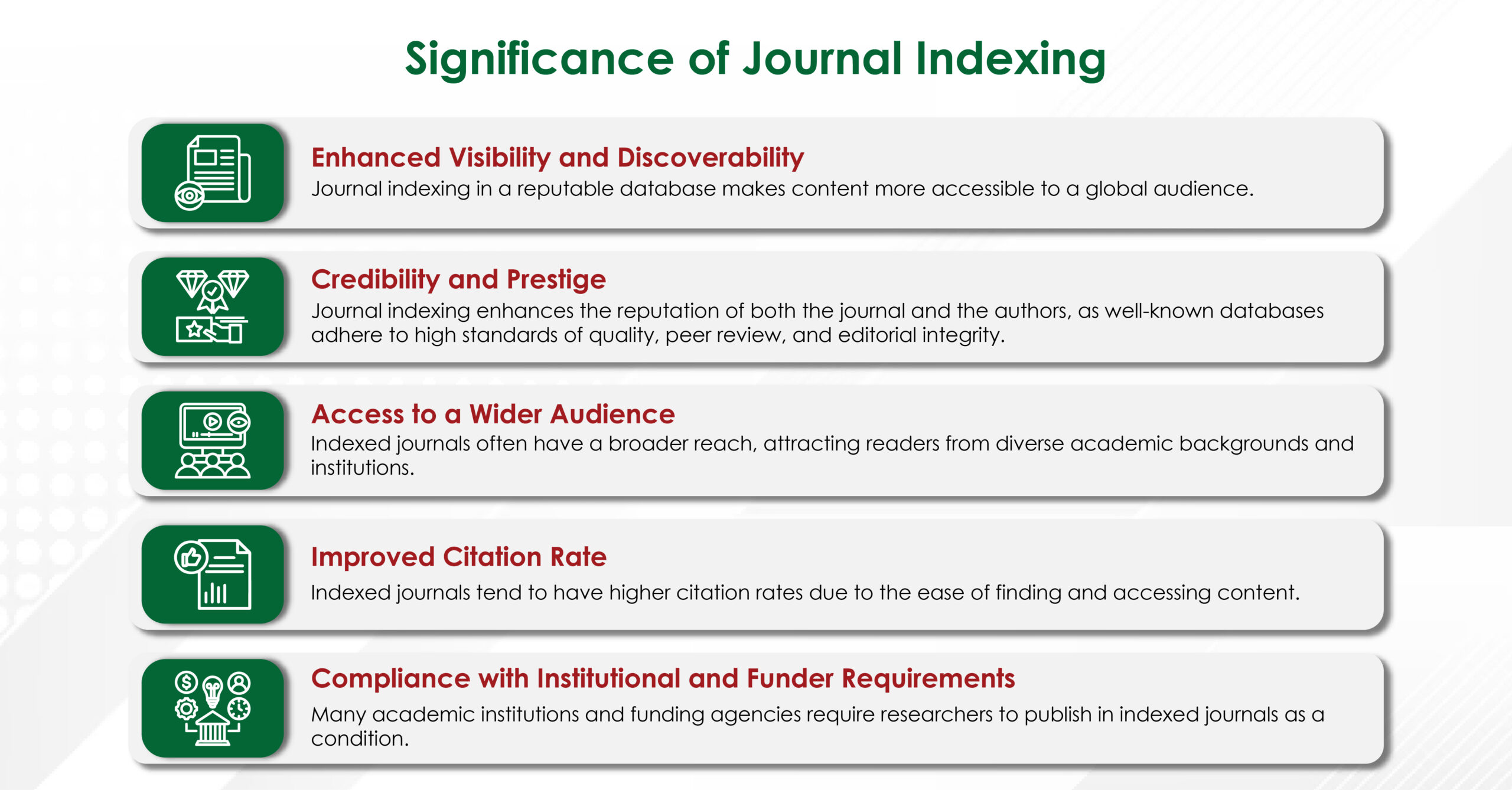In the rapidly evolving academic publishing world, journal indexing plays a pivotal role in determining the visibility, accessibility, and credibility of research. Whether you are a seasoned researcher or a novice in the field, understanding the importance of journal indexing is crucial for navigating the publication landscape effectively. This blog explores the significance of journal indexing, the process through which journals are indexed, and the implications of indexing for the visibility and credibility of research.
What is Journal Indexing?
Journal indexing refers to the inclusion of academic journals in a database or directory that categorizes and lists publications based on specific criteria. These databases serve as repositories of scholarly content, making it easier for researchers, academics, and professionals to discover relevant literature in their fields. Common indexing databases include PubMed, Scopus, Web of Science, and Google Scholar.
Indexing databases vary in scope and specialization. Some are broad and multidisciplinary, covering a wide range of academic fields, while others are more specialized, focusing on specific disciplines, such as medicine, engineering, or social sciences. The inclusion of a journal in these databases is often seen as a mark of quality and credibility, as indexed journals are subject to rigorous evaluation.
The Significance of Journal Indexing
- Enhanced Visibility and Discoverability: One of the primary benefits of journal indexing is its increased visibility of published research. When a journal is indexed in a reputable database, its content becomes more accessible to global audiences. Researchers can easily find articles through keyword searches, leading to a higher likelihood of citations. Increased visibility can have a cascading effect, contributing to the academic impact and recognition of the research.
- Credibility and Prestige: Indexing is often associated with credibility and prestige in the academic communities. Journals indexed in well-known databases generally adhere to high standards of quality, peer review, and editorial integrity. This recognition can enhance the reputation of both the journal and the authors who publish in it. Researchers are more likely to submit their work to indexed journals, if they know that they will be taken seriously by peers and evaluators.
- Access to a Wider Audience: Indexed journals often have a broader reach, attracting readers from diverse academic backgrounds and institutions. This can lead to more collaborations, discussions, and advancements in the field. Publishing in an indexed journal means that their work is more likely to be read and cited by others, thus contributing to the overall growth of knowledge within their discipline.
- Improved Citation Rates: Articles published in indexed journals tend to have higher citation rates than those in non-indexed journals. This is partly due to the ease with which these articles can be found and accessed in databases used by researchers worldwide. Citations are a key metric for assessing the impact and influence of a researcher’s work, making indexing an important factor for academic success.
- Compliance with Institutional and Funder Requirements: Many academic institutions and funding agencies require researchers to publish in indexed journals for career advancement, grant approval, or research funding. Indexing serves as a form of validation, ensuring that the research meets the established standards of quality and rigor. Researchers can fulfil these requirements and enhance their professional credentials by publishing in indexed journals.
How Do Journals Get Indexed?
The process of getting a journal indexed is rigorous and involves several steps. Indexing databases have specific criteria that journals must meet for inclusion. While these criteria may vary depending on the database, some common factors include the following:
- Peer Review Process: One of the most critical aspects of journal indexing is the resilient peer review process. Indexing databases prioritize journals that demonstrate a commitment to thorough, unbiased, and transparent peer review, ensuring the quality and reliability of published research.
- Editorial Quality: The overall quality of the editorial process, including the qualifications and expertise of the editorial board, plays a significant role in determining whether a journal is indexed. Journals with reputable editors, who are experts in their fields, are more likely to be indexed.
- Publication Ethics: Adherence to ethical publishing practices is essential for indexing. Journals must demonstrate a commitment to ethical standards, including conflicts of interest policies, proper attribution of authorship, and transparency in the publication process. Journals that engage in unethical practices, such as predatory publishing, are unlikely to be indexed.
- Timeliness and Regularity: Indexing databases prefer journals that publish regularly and on time. Consistency in publication frequency and the timely release of issues are important indicators of a journal’s reliability and professionalism.
- Originality and Relevance: The content published in a journal must be original, relevant, and contribute to the advancement of the field. Indexing databases assess the significance and impact of the research published in the journal as well as their relevance to the academic community.
- International Standard Serial Number (ISSN): An ISSN is a basic indexing requirement. The ISSN serves as a unique identifier for the journal, helping databases categorize and track it accurately.
- Citations and Impact Factor: Some indexing databases consider a journal’s citation metrics, such as its impact factor, when making indexing decisions. Journals with higher citation rates and impact factors are more likely to be indexed as they demonstrate the journal’s influence and importance in its field.
Read More: The Future of Academic Publishing: Trends and Predictions
The Impact of Indexing on Research Visibility and Credibility
Journal indexing has a direct impact on research visibility and credibility. When a journal is indexed, it gains a wider audience and becomes more accessible to researchers worldwide. This increased visibility can lead to higher citation rates, thereby enhancing the academic impact of research.
Moreover, indexing serves as a mark of quality and reliability, signalling to the academic community that the journal adheres to high standards of peer review, editorial integrity, and ethical publishing practices. Consequently, research published in indexed journals is often viewed as more credible and trustworthy.
Publishing in indexed journals can significantly boost their professional reputation and career prospects. Indexed publications are often considered more prestigious and given greater weight in academic evaluations, tenure decisions, and funding applications.
In the competitive landscape of academic publishing, journal indexing plays a crucial role in determining the visibility, accessibility, and credibility of research. By understanding the significance of indexing and the process by which journals are indexed, researchers can make informed decisions about where to publish their work.
At Turacoz, we understand the importance of targeting the right journals for research purposes. We employ indexing databases to identify the most suitable journals for your work, ensuring that research reaches the widest possible audience and achieves the recognition it deserves. Whether you are looking to publish in a highly specialized journal or a multidisciplinary platform, our expert medical writers help in journal selection and navigate the complexities of academic publishing with confidence. For more information, visit www.turacoz.com to discover how proper journal indexing can enhance your research visibility and impact.







































